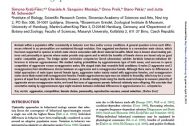Obsah
Animals within a population differ consistently in behavior over time and/or across conditions. A general question is how such differences
referred to as personalities are maintained through evolution. One suggested mechanism is a nonrandom mate choice, which
has been supported in species in which mate choice associates with direct material benefits. Much less is known about mating patterns
and personality in species where males provide only sperm and in which the benefits of female choice are based only on good
and/or compatible genes. The bridge spider Larinioides sclopetarius Clerck (Araneidae) exhibits heritable between-individual differences
in intrasex aggressiveness. We studied mating probabilities by aggressiveness type of both sexes, and success in sperm
competition of aggressive versus nonaggressive males. We staged trials that resemble field conditions: 4 males (2 aggressive and 2
nonaggressive) had simultaneous choice between an aggressive and a nonaggressive female. Although there were no differences in
initial approaches of male types toward female types, aggressive males mainly mated with aggressive females, and nonaggressive
males more likely mated with nonaggressive females. Female aggressiveness type was not related to fecundity, which may be a consequence
of equal food supply in the laboratory. However, in double-mating trials using the sterile-male technique to measure paternity of
aggressive versus nonaggressive males, we found that sons of aggressive parents fathered relatively more offspring. We conclude that
assortative mating by aggressiveness type might maintain between-individual differences in aggressiveness in Larinioides sclopetarius.



